Jane Campion western film The Power of the Dog blows Venice away
In the trailblazing director’s first feature in 12 years the twists come thick and fast — and it already has Oscars buzz.
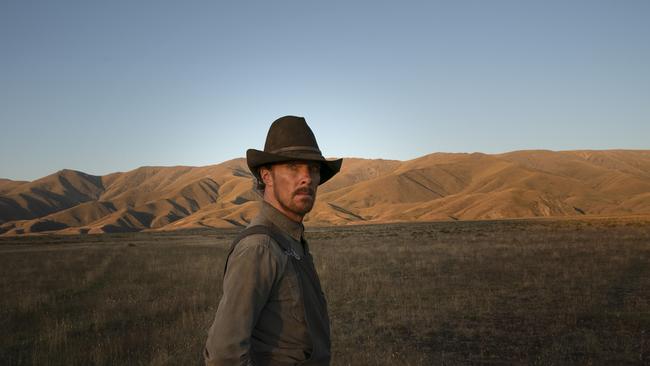
After Jane Campion’s The Power of the Dog screened to the press on Wednesday in Venice journalists were huddled in groups discussing what it was all about. When the provocative Australia-New Zealand-UK-Netflix production releases here in November Australian audiences are likely to do the same.
Now, as the reviews have come out, the film has critics reaching for superlatives. In its five-star review, The Times says “Benedict Cumberbatch and Jane Campion, take a bow. The pair have united to deliver an indecently powerful western that is instantly, on day two of the Venice Film Festival, the movie to beat for the festival’s prestigious Golden Lion award, and indeed the frontrunner at next year’s Oscars.” Screen bible IndieWire singles out a career-best performance from Benedict Cumberbatch, clearly an awards contender, and calling the film “a brilliant, murderous fable about masculine strength that’s so diamond-toothed its victims are already half dead by the time they see the first drop of their own blood.”
The Power of the Dog marks Campion’s first feature since 2009’s Bright Star and after making two seasons of the television series Top of the Lake she was yearning to return to the feature film format. Still, she was not about to take the easy route as her chosen project was adapting Thomas Savage’s Montana-set semi-autobiographical 1967 novel — a tough prospect.
“I really just fell in love with the book,” she says. “It’s almost like I get this energy in my body that’s running me, you know, and the book gave me that and also a lot of fear. It’s so big and complex. I remember feeling like I was sitting on the edge of a cliff for a long time and having a lot of disturbing dreams. I was really interested in how it haunted me. After I read it, I thought, ‘Oh, that’s a really clever story’.”
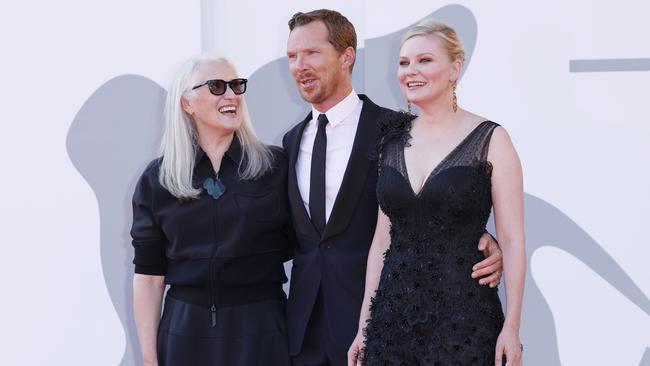
Certainly the twists and turns come thick and fast towards the end of the film, which might initially seem like a western but is ultimately what Campion describes as “a chamber piece” focusing on an intriguing set of characters.
“You have the feeling that Thomas Savage lived that life. So it’s not just made up. A lot of it is from his experience of growing up in southwestern Montana so you feel the authenticity of it, and also the complexity of it. I was shocked by the character studies and thought that was brilliant. Nowadays I don’t read so many amazing novels.”
The story follows two brothers, Phil and George Burbank, who in the mid 1920s have been running a Montana cattle ranch inherited from their parents. They are so intertwined in each other’s lives that even if they live in the family mansion, they still share a bed. When the younger good-natured George (Jesse Plemons) marries a young widow Rose (Kirsten Dunst), the brutal Phil (Cumberbatch) attempts to break the marriage apart by taking clear aim at his brother’s new bride. Phil then takes Rose’s teenage son Peter (a likewise incredible Kodi Smit-McPhee) under his wing, teaching the delicate lad how to ride a horse and generally toughening him up. While we might think we know where all this is headed, the story veers off in an unlikely direction.
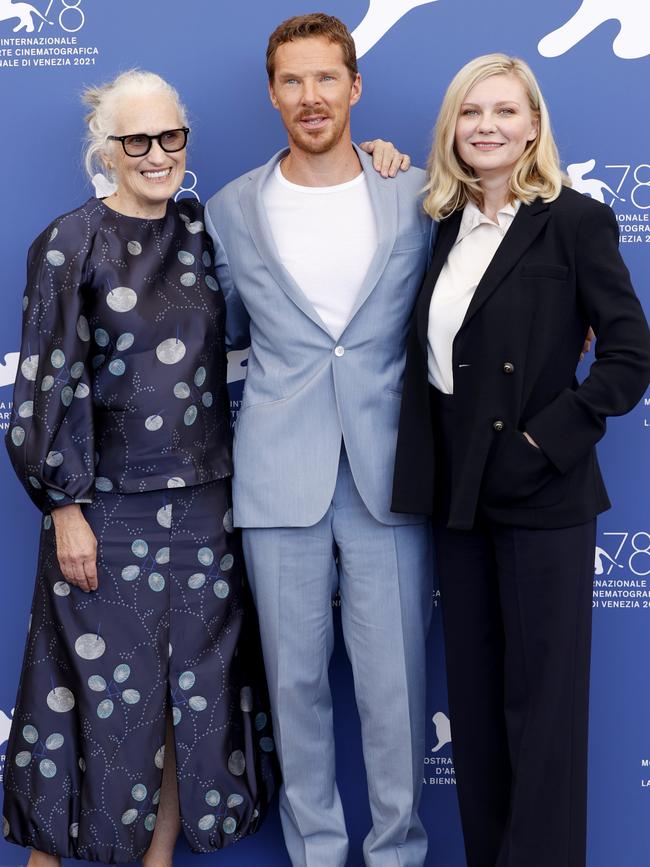
At the film’s Venice press conference the ever affable Cumberbatch explained his Phil character. “His toxicity is a product of his upbringing. I can understand it. I don’t condone it. It’s part of who he is. It’s part of his flaw and personal tragedy. I understand that he is repressed, isolated and is worried about what he has created being taken away.”
Once Cumberbatch started to understand him as he played him, he says Phil couldn’t be “the cookie cutter antagonist/bad guy”.
“There’s a kind of beautiful poetry and complexity in the whole situation that Thomas Savage explores in the book as well as what Jane has made in the film.”
Of course the actor had played Necromancer and had voiced the fire-breathing dragon Smaug in Peter Jackson’s The Hobbit movies before working with Campion in a remote part of New Zealand’s South Island on a property near the Hawkdun Ranges area in Central Otago.
“I LOVED going back to New Zealand,” he notes emphatically. “I couldn’t get enough of it.
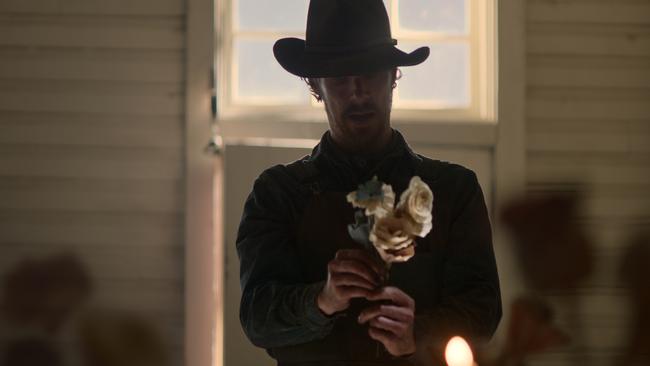
It’s an extraordinary country. It held us in a very precarious moment in our human history as a family as I had my wife and children and my mum and my dad there as well. So we were very, very fortunate to be in that country with these people. I’d happily go back to play a cookie cutter role as well. Any excuse to go down there. I think I need it. I hope I’m allowed back in.”
Britain’s Iain Canning and Australia’s Emile Sherman are two of the film’s producers via their company See-Saw Films (the pair were also behind the Oscar winner, The King’s speech). In Venice, Canning addressed how the film’s Montana setting was easily replicated in New Zealand.
“We were lucky to work with Jane on Top of the Lake, so we’re very aware of that incredible landscape. On one trip we had photos of Montana alongside photos in New Zealand, and we were asking various people from Montana which location was Montana and often they would pick the New Zealand photo. So it really works. I think it also brings a magical sense to the film, which also works well with Jane’s storytelling.”
The Year of the Dog is one of five films directed by a woman in the Venice competition, whereas last year there were eight women directors, including Chloe Zhao, whose film Nomadland took out the top prize, The Golden Lion, before winning the Academy Award for best film. Campion of course is no longer the only woman to win the Palme d’Or in Cannes —where The Piano won in 1993 — as this year Julia Ducournau’s Titane took out the coveted award.
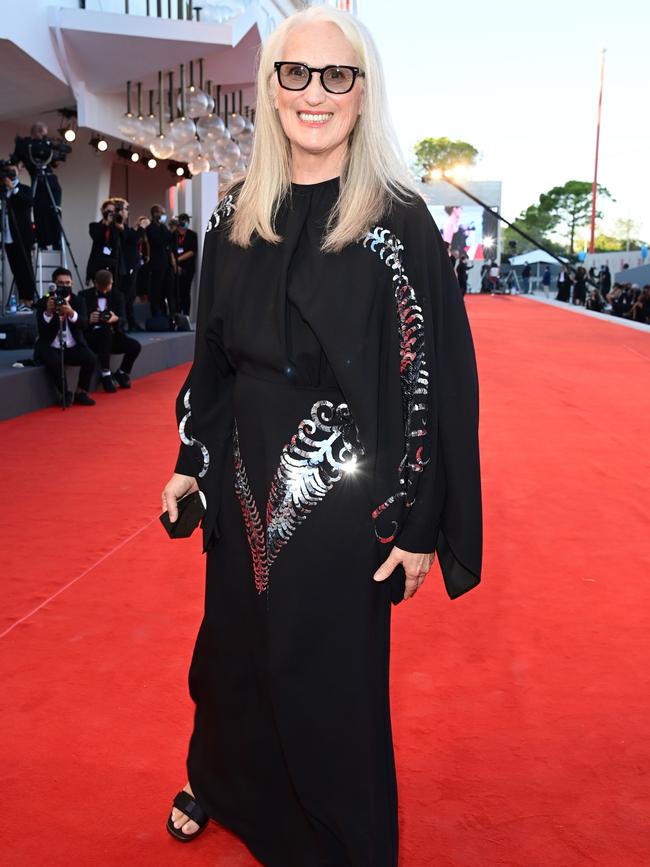
“I feel relieved,” Campion admits. “Every year you go like, please. The cinema world is for women too and now we are seeing some change and I really put it down to a sort of general tsunami or surge coming from the #MeToo movement.”
Does she consider that she opened doors for this to happen? “People tell me that, but I don’t know unless they tell me so. Everyone wants to speak with their own voice and that’s what you hope for.”
Next up The Power of the Dog is set to screen at prestigious festivals in Telluride, Toronto, New York and London. Then Campion will head for Lyon to receive the Prix Lumiere, a kind of career tribute, at Thierry Fremaux’s Lumiere Festival. There’s a sense of irony as Fremaux is also the artistic director in Cannes where The Year of the Dog was unable to screen as it’s a Netflix film.
“I’m so excited, it will great,” she enthuses. “Thierry’s so good. He has a lot of energy.”
Campion, who lives between Sydney and her native New Zealand and considers herself antipodean, has only good things to say about Netflix.
“They provided a budget I hadn’t worked with before and fortunately they value artistry.”
They also stuck by the film after it was closed down halfway due to the pandemic.
“I remember saying, ‘Oh, we finished the exteriors and now we’re in the studio, what can go wrong?’ And two weeks later, we were shut down. I mean, Covid came like that!” she recalls clicking her fingers. “It was the most extraordinary thing in my lifetime to see the whole world shut down so completely and I was like, who cares about a movie? People were dying everywhere. So I was just resting, I was exhausted anyway, and I didn’t know if Netflix would want to put up the extra money to get it back up, or whether the insurance would pay. Nobody was expecting a pandemic.
“But New Zealand turned the situation around super quick and we’ve really lived in a Covid-free environment for the whole time more or less until now. They’ve got another Delta surge, but it’s pretty tiny.
“So I’m very grateful to Jacinda Ardern and her government. I mean, she’s a fantastic leader and she’s not self-glorying. She really is about trying to look after the people, to look after the country and we were able to get the actors back. Everyone had to do two weeks of serious quarantine and many of them had to do four weeks.
“They had to do it when they went back to Australia or wherever else they would be going. It was a burden, but I think people felt within the context of the pandemic, that it was also a privilege to be able to finish. And we were very grateful to Netflix, who showed a lot of compassion to the crew and gave them a couple of weeks’ extra wages to manage the hiatus and a lot of reassurance that they would be behind us and that they love what we’re doing. Actually we all came back super-motivated.”
The Power of the Dog releases in cinemas November 12 and later on Netflix.

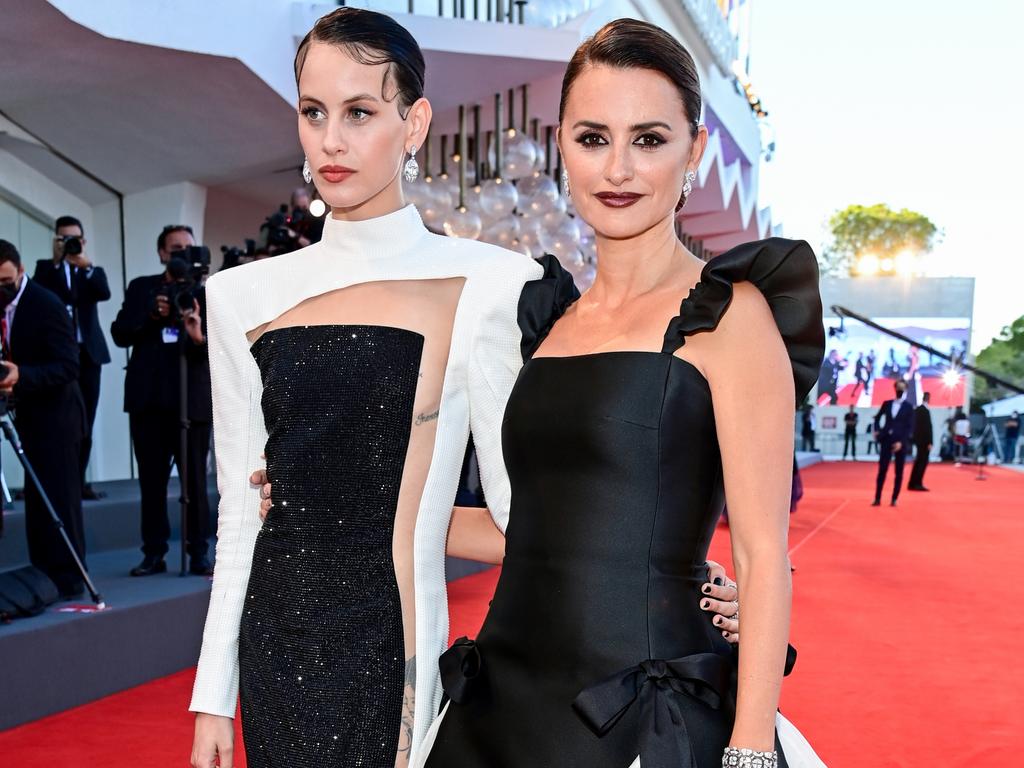

To join the conversation, please log in. Don't have an account? Register
Join the conversation, you are commenting as Logout